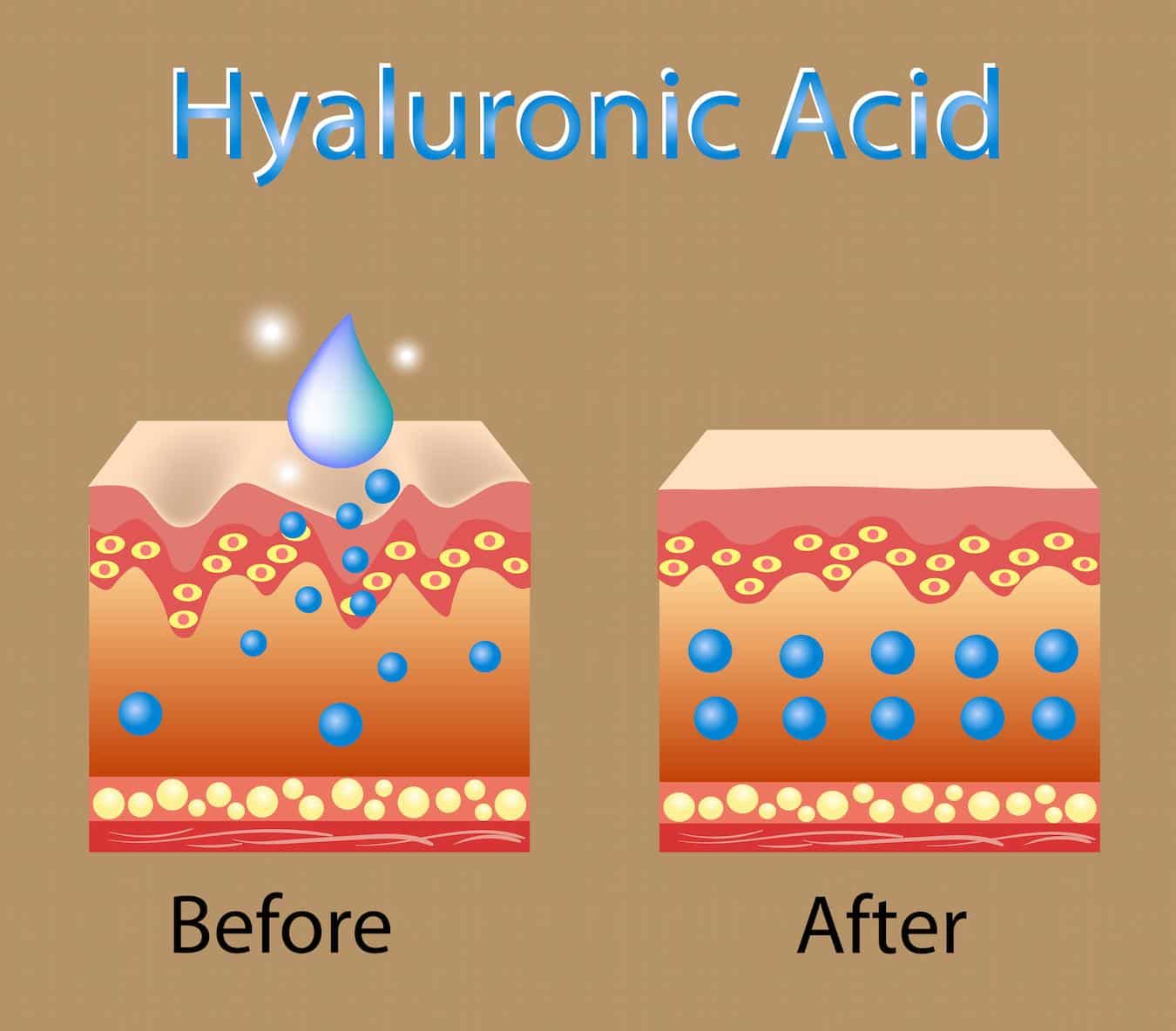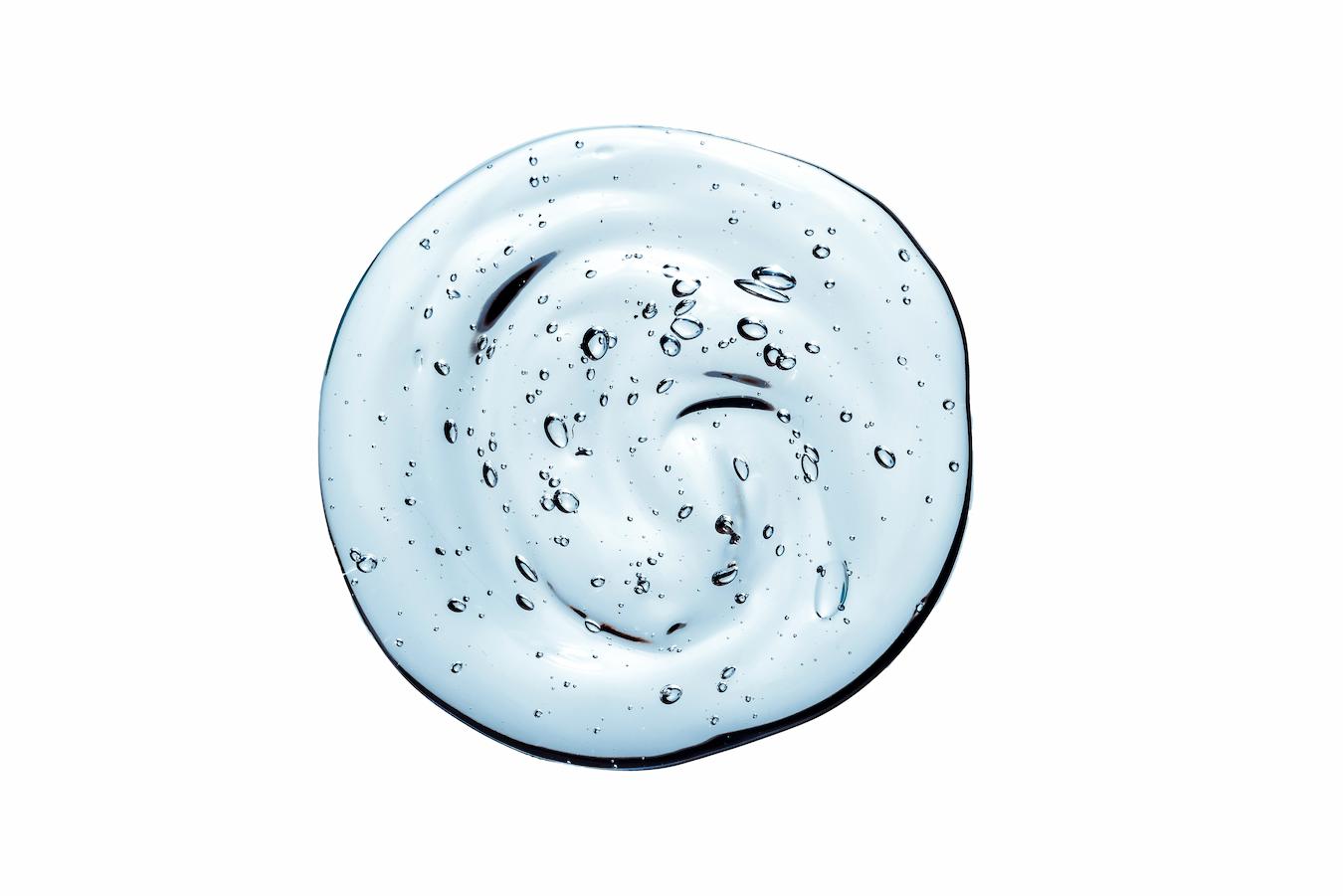What Does Hyaluronic Acid Do For Acne?
Hyaluronic acid is now the trend, but it may not just be a fleeting fad. Even though it is best known as a humectant, which is a chemical that helps the body hold on to water, it can be used for other things besides keeping the skin from getting old.

Hyaluronic acid also helps soothe skin that is prone to eczema, gives skin a dewy look, heals acne, and makes scars less noticeable.
If you have acne-prone skin and are looking for a new way to treat it, you should try hyaluronic acid. In today’s post, you’ll learn more about why hyaluronic acid is vital to your skincare routine and what it can really do for people with acne-prone skin.
See Related: What Is A Good Night Time Skin Care Routine? A List Of Do’s And Don’ts
What is hyaluronic acid?
Hyaluronic acid is a colorless substance that is produced naturally inside the human body. It is crucial for keeping your body hydrated and lubricated, and it may be found in your connective tissue, eyes, and skin.
Since it can bind to water and helps maintain the thick, bright look of healthy skin, having a supple dermis is an extremely vital element of having a good complexion. This indicates that hyaluronic acid may be used to treat a wide variety of issues, including wrinkles, acne, and even hyper-pigmentation brought on by exposure to the sun.
One of its primary functions is to increase skin cell turnover. In short, it gets rid of dead skin cells for you. This helps remove dead skin, giving your face a fresh, rejuvenated look and feel. Second most important function: It helps retain natural moisture in the skin cells resulting in supple skin that is healthy and hydrated.
If those two reasons aren’t enough, read on for even more benefits to adding hyaluronic acid to your daily skin care routine.
How does hyaluronic acid work?
Hyaluronic acid is a type of polymer that looks like a long, twisted chain. Other chemical parts, like water, can attach to the chain at any of its many areas where it can be connected.
This means that a quarter of a teaspoon of hyaluronic acid can hold almost 1.5 liters of water, making it the best and most natural polymer for absorbing moisture. Although hyaluronic acid is very small, it can hold so much water (a key ingredient in moisturizing products).
Hyaluronic acid is an excellent compound for moving other compounds around your body because it has many empty spaces that other molecules can connect to. Hyaluronic acid can also stick to cells, which is one of the main reasons experiments into the targeted treatment of drugs that use hyaluronic acid are considered essential.

Hyaluronic acid is made up of chains, so it could work as a framework that helps tissues grow and change. Wounds on your body won’t completely heal until this step is done.
It has also been found that hyaluronic acid is present in human embryos. Scientists are now looking into what role hyaluronic acid plays in reproduction and development.
Why should you use hyaluronic acid?
Two words: Radiant skin.
When applied to the skin in the form of anti-aging cream, serum, or any other product, it makes a layer that is absorbent and lets the product go deep into the skin. This keeps the skin from getting dry and makes it look like it has more suppleness.
If you have acne-prone skin, you need to be very careful when shopping for cosmetics. Hyaluronic acid’s ability to leave skin feeling clean and smooth suggests it may be helpful for those prone to acne. Here are five benefits of hyaluronic acid:
Reduces the appearance of acne
If you have acne-prone skin, you’ll want to consider using a hyaluronic acid serum. Acne is a common problem that almost everyone has, and there are many things that can cause it.
Fortunately, hyaluronic acid is a powerful ingredient used on the skin to make it feel better and keep it hydrated. In addition to helping improve acne scarring, it also helps reduce inflammation. Using skin care products that include hyaluronic acid is an excellent method for addressing such issues.
Helps keep the natural moisture
Even if you have acne-prone skin, it is still important to keep your complexion from drying out, and hyaluronic acid is a great way to do this. It makes the skin feel better overall and keeps it from getting dry and spotted, which is a big benefit.
It boosts skin hydration
All types of skin need to have more of their own natural moisture added to them. Skin that gets acne is more sensitive than other skin types, so be careful when choosing products for it. Hyaluronic acid gives the skin a natural way to get hydration, which makes the skin look clearer and fuller.
Calms the surface of the skin
Acne is one of the many skin conditions that can cause the skin to burn and cause other problems. Hyaluronic acid has been shown to help reduce the look of acne scars while calming the skin at the same time. The skin is left feeling peaceful and soothed as a result.
Gives the skin a glow
Everyone wants skin that looks healthy and feels like it’s glowing. Hyaluronic acid is also known for its ability to unclog pores, which is one way to get smooth, clean skin.
It makes it easier for the skin to breathe and speeds up the healing of any scar tissue. The moisture can’t get out because of how well it naturally hydrates. This has a cumulative effect that makes the skin brighter and smoother over time.
How to apply hyaluronic acid properly to prevent acne breakouts?
Choosing the highest-quality hyaluronic acids made with the best ingredients is a great place to start if you want to keep your skin from getting dry and prevent breakouts. This can be done by choosing the right product.

If you put HA directly on dry skin, you won’t get much benefit from it. Below are two essential steps you shouldn’t miss when it comes to applying hyaluronic acid properly.
- Putting a little mist or pat of water on your face will make sure that the product has a source of moisture to start with. Simply put, hyaluronic acid will make you dry out if there isn’t enough water coming from deep within your skin layers.
- Next, seal it with a moisturizer after applying hyaluronic acid on damp skin. That’s it!
If you skip the first step, you might lose water through the skin, making it drier and increasing the likelihood of acne.
Bonus: Where to Apply Liquid Foundation
What ingredients to look for when buying hyaluronic acid:
When searching for a good hyaluronic acid product, it might be important to keep a few things in mind.
- You should know that hyaluronic acid works best in cosmetics that help keep the skin moist. Don’t forget that it might also be labeled as sodium hyaluronate. This is a form of compound with a smaller molecule that is often sold at a lower price.
- Stay away from anything with harsh ingredients like alcohol or a strong smell and anything with a lot of acids.
Most creams, lotions, and serums you can buy without a prescription are made with water and have less than 2% hyaluronic acid. There are many different price points for these products.
Using moisturizers with a lot of humectants might actually cause more water to leave the body through the skin, thus causing drier skin. This is an excellent example of how more of something does not always make it better.
- For a product to be considered a good moisturizer, it must stop water from leaving the skin and evaporating into the air around it. The most effective moisturizers also contain chemicals called occlusives, which are responsible for doing just this.
Occlusive ingredients to look for:
- Avocado oil
- Beeswax and carnauba wax
- Shea and cocoa butter
- Lanolin, and stearic acids
Furthermore, keep an eye out for these ingredients which go well with hyaluronic acid in products:
- Vitamin C is an antioxidant that may help relieve dry skin and protect it from damage that the environment can cause.
- Vitamin B5 is used to help soften and smooth the skin even more.
How often do you use it?
First of all, it will depend on the type of product you are using. There are many different products that contain hyaluronic acid. However, moisturizers and serums are the most common products with hyaluronic acid ingredients.
- MOISTURIZERS. Rather than using a regular moisturizer to keep your skin hydrated, try a product with hyaluronic acid instead. This should be done at least twice a day, and ideally, it should be done right before bed. This step is best done after you’ve washed your face, exfoliated, or used serums.
- SERUMS. The way hyaluronic acid serum is made is a little bit different. After washing your face, use the palms of your hands to put a few drops of the product on your face while your skin is still a little damp from washing. Putting on a moisturizer right after using a toner will help you keep as much moisture as possible in your skin.

When to seek professional medical advice about hyaluronic acid
If you are thinking about using hyaluronic acid as a part of your skin care routine, the first thing you should do is talk to your primary care doctor or a Board-Certified dermatologist about it. You may also want to ask them about how hyaluronic acid can be used to treat or help with the following skin conditions you may have. You can do this by asking the following questions:
- Skin care (specifically stiffness, scarring, dryness, and skin diseases like actinic keratosis and scleroderma).
- Eye care, especially the different ways that people with dry eyes, can get help.
- Joint wellbeing, particularly in terms of how to treat soft tissue injuries and arthritis.
- For treating wounds that usually take a long time to heal.
- As a possible method of treatment for pain in the bladder or pain caused by interstitial cystitis.
- Conditions that make it hard to breathe, like asthma,
Is it safe to use hyaluronic acid?
Yes, but it depends on how you use it. Most people think that using hyaluronic acid serums and products that can be bought without a prescription and used on the skin (such as lotions, creams, and other similar products) and on the eyes is safe.
Hyaluronic acid products taken by mouth are also safe. However, you should still tell your primary physician about them, as you would for any other medication, vitamin, or supplement).
When using hyaluronic acid products that need a prescription, it is vital to follow the recommended medical advice. If you consulted a Board-Certified dermatologist, be sure to follow their instructions as well. Any kind of hyaluronic acid injection should only be given by a trained medical professional with the right credentials and experience.
Is applying hyaluronic acid every day good for your skin?
Yes, hyaluronic acid can be used daily without risk and can also help keep the skin’s natural moisture balance. You just need to make sure you’re using it right.
Hyaluronic acid products should be put on clean, wet skin before a moisturizer and face oil are placed on top to seal them in. This is how things are usually done.
Hyaluronic acid might not work well if you put it on top of other products, like sunscreen or moisturizer. Moisture needs to stay on the surface of your skin so that it doesn’t get sucked into the deeper layers and then leave through the barrier that your skin makes. People often think that all they have to do to treat their skin with hyaluronic acid is put on a serum.
Unfortunately, this is one of the most common mistakes people make when they use this product. Instead, you should think of hyaluronic acid as more of a team player that works best when added to the cream.
Even though hyaluronic acid keeps the moisture, a typical moisturizer for dehydrated skin will also include an emulsifier and an occlusive to soften and keep the oils in the skin.
Where does hyaluronic acid present in skincare products come from?
You may be wondering how hyaluronic acid, which is naturally present in your body, makes it into skin care products. Don’t worry because it’s not extracted from humans. The primary sources are plants and animals.

Through a process known as microbial fermentation, hyaluronic acid is produced from plants. Hyaluronic acid is already present in this kind of microbe, fermented to provide the proper molecular weights for skin care.
The comb, or the red skin on top of a rooster’s head, creates hyaluronic acid, an animal product. Like humans, animals produce hyaluronic acid in their bodies. One of the greatest animal sources is considered to be the comb of a rooster.
Hyaluronic acid derived from plants is used in most natural, organic, and vegan skin care products. However, animal-derived hyaluronic acid is still often used in injections and supplements.
Final Thoughts
Hyaluronic acid generally does a great job sitting on top of your skin and keeping moisture all day. However, since it is not guaranteed to get excellent results for everyone, you must exercise caution while using it.
Once you decide to add hyaluronic acid to your skincare routine, always put it on clean, damp skin before locking it in with a moisturizer, and see a dermatologist if something seems off.
Keep Reading: When To Exfoliate In Your Skin Care Routine
—
For over 60 years, Viviane Woodard has represented “The Purity of Skincare”. We are the leading beauty brand for skin care products and promote the importance of good skin hydration. Follow us on Facebook, Instagram, Twitter, and Pinterest for skin care tips, product discounts, and more.
